
15 minute read
MFL
Bienvenido, Bienvenue & Wilkommen Languages over the years
As the theme of this year’s magazine is centred round the 100 year anniversary we have been discussing changes that have taken place in language learning. Although I have been learning and teaching languages for many years even my experiences didn’t stretch back that far. I have therefore done some research and called on former colleagues to share their thoughts. Miss Morley who was my first Head of languages here at BSGD, was judged to have very innovative methods when she arrived in the mid 50’s and only spoke French in the classroom. The girls did complain, but were told by the Deputy Head that they would get used to it. Emma Saxelby who taught in the Boys Division published books on the “direct method” of language learning and these became famous worldwide. The Saxelby gate in the school grounds stands in her memory. Learning phonetics in order to ensure good pronunciation was also considered very important and girls were allowed to bring a mirror into school so that they could check that their mouths were in the correct position – some thought this had the potential to be very disruptive! When reel to reel tape recorders were introduced along with a grainy film strip depicting the antics of “la famille Marsaud” things started to get very exciting. I remember delivering a presentation to the governors on the use of the Overhead Projector (there are some still to be found lurking in the Art department) and then on how we might use a language lab. With the introduction of computers and more recently ipads we now have access to a wealth of exciting material. Interactive online textbooks have been the latest addition to the language department this year and communication with exchange partners via Instagram, Whatsapp and even Skype if we are feeling very brave has given us access to authentic language in seconds. On the language pages you will find lots of examples of how we are both using and exploring the use of new technology and taking advantages of all the opportunities for travel abroad and extracurricular activities which are available to language learners in the 21st century. Angela Shafiq Head of MFL.
Providing the linguists of the future...
On 8th of November, we were delighted to welcome over a hundred talented linguists, from both Divisions and from 14 other schools in the region. The day got off to good start with a French breakfast and language quiz in the Riley Centre café which provided an opportunity to mingle and swap linguistic experiences. The opening talk by Dr Roel Vismans from Sheffield University provided an excellent range of information about the possibilities for studying languages as a single honours degree or in combination with other subjects such as economics, science and engineering. To end the talk, Dr Vismans invited Bryony Mutton, a former BSGD student, to give us a student’s insight into studying at Sheffield and the exciting prospects offered by the year abroad. Students were then able to practise their own linguistic skills in their chosen post GCSE workshop and try a new language taster session in either Italian, Russian or Arabic. To bring the event to a close we were very fortunate to be joined by Andrea Cockram, a former student, currently living in Paris where she runs her own communications company and lectures at the Sorbonne. She was able to illustrate the value of languages both in the world of work and as a skill which makes us better communicators, more culturally aware and offers endless interesting and enjoyable opportunities.
Honing our linguistic skills...
In November, four teams of linguists took part in the North Schools’ MFL Debating Competition at Cheadle Hulme School. They had to debate topics such as ‘Give me a pen, not a gun’, ‘University education is a waste of time and money’ or ‘Let’s tackle poverty here, not abroad’. Some of the topics were hard to debate in English, let alone in French, German or Spanish. Nonetheless, all the teams did a fantastic job and showed excellent debating skills and command of their foreign language. Some teams reached the semi-finals and everybody agreed it had been a great experience.

Málaga
This Easter the annual Year 10 study trip to Málaga was not blessed with the usual sunny weather, but this didn’t dampen our spirits. Manuel’s tour of the city pointing out the famous sights as well as the best ice-cream shops was a big hit. A tour of Picasso’s house and museum where we discussed selected works by the artist meant that we learnt a lot about Málaga’s most famous painter and even managed to get him to pose for a photo! The weather didn’t stop us from improving our dance moves with a flamenco master class or from sampling “chocolate con churros” in the town’s oldest “churrería”. On the last day we visited the impressive aqueduct in Ronda and the bull ring. We learnt about the history of the town as well as the traditions of bullfighting and there were some lively debates on the topic. On Sunday 19th October, we left Manchester for Southern Spain; despite flying across Europe we landed to find ourselves still on British soil… in Gibraltar! Fortunately, the weather was very different to that which we had left behind in England and after crossing the border, we were finally in Spain, and ready to meet our host families.

On Monday morning we met our teacher at Trinity Language School – José. He would be our teacher for the next three mornings at the school, where we enjoyed different sessions to help us improve our Spanish. In the afternoon, we were treated to trips of the local area – firstly we
were taken on a tour of the town with one of the teachers from the language school – Loli. Unfortunately, some of us got more than our bearings: the next morning we all met up at the language school to find we had all been bitten by mosquitos in the night, with some members of the group suffering considerably more than others! We also enjoyed trips to the beach; a ‘bodega’ where sherry is produced, as el Puerto de Santa María is part of Spain’s‘sherry triangle’; as well as a trip to Cádiz with Marta from the school. On the Thursday we went for a day trip to Seville, where we visited a number of tourist sites, including ‘La Plaza de España’ and the Cathedral (where Christopher Columbus is buried). We had a great time on this trip and I would really recommend it to anyone who is taking Spanish, wants to improve their confidence and enjoys eating a lot of ice cream!
Stephanie Higgins



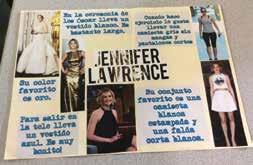

La casa será inteligente Alarmas que usan huellas digitales Cómoda con muchos artículos de lujo Aparatos electrónicos muy avanzados Será más ecológica Ahorrará energía Dormitorios que apagarán las luces cuando te acuestas Educación interactiva en los dormitorios de los niños Los aparatos podrán hablar Fabricada con madera y vidrio Una conexión a internet muy buena Tendrá pantallas interactivas en cada cuarto Una inteligencia artificial Reconocerá a cada individuo Opciones para cambiar la decoración
Alex Brown and Amber Tobin
Film Competition
Congratulations to Ella Kaut-Hauson in Year 8 who received a “Special Commendation” for her entry into the Oxford University film essay competition in the Years 7 to 11 category. Her task was to watch the first half of the film “Le Petit Nicolas” and to imagine her own ending. Ella’s creative writing impressed the judges who wrote to say that hers was “a very strong entry within a competitive field”.
Year 9 and 10 French Exchange
This year, the French Exchange with Le Collège Saint-Benoît celebrated its thirtieth anniversary in style by travelling to France by plane for the first time! Whilst in Moulins, the girls enjoyed a busy week full of activities and visits allowing them to practise their French first-hand. I have thoroughly enjoyed French Club this year. We have done all sorts of fun activities, from arts and crafts to charades. One of my favourite things was when we had to run around the school with a checklist of objects in French; we had to find them and take a picture of them. I found it really interesting learning about many of the different traditions in France and playing a game on the French regions. As I progressed with French in lessons, French club gave me the opportunity to have a conversation in French with someone from France. I have made cards for Christmas, Valentine’s Day and Mother’s Day, learnt about what people in France do on those days and practised new vocabulary in writing the cards. Katy (the French assistant) is always really helpful and she brings in lots of games and resources for us.
Grace Hansford Theatre Production
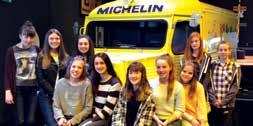
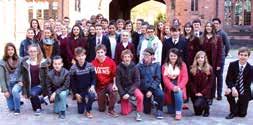
On Monday 1st June, Year 8 French enjoyed the annual visit from Onatti’s theatre company. This year’s play, Erreur d’identité, was set in a hotel in France where the owners, Pierre and Rose-Marie, are convinced that one of their customers is an escaped prisoner they read about in the newspaper.
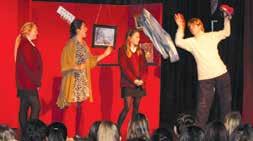
Spelling Bee
Spelling has always been important in languages, but this competition makes it fun. Twelve Year 7 girls showed nerves of steel as they competed in front of the whole year group in a French Spelling Bee Competition. The girls had to learn a bank of one hundred words in preparation for the competition, and had to spell as many as possible in one minute. French teacher Miss Tomlinson gave each girl an English word. Pupils had to translate the word into French, say it out loud, and then spell it using the French alphabet including accents and punctuation. This would be difficult enough at the best of times, but doing it on stage and in front of the whole year group definitely intensified the pressure! Ordinarily girls would be able to recall and spell just a few words in a minute but the competitors recalled up to sixteen words. The girl who spelled out the most words correctly won the prize. It was an incredibly close competition, but the outright winner was Haleemah Mohammed with sixteen words, closely followed by Nabilah Thagia with fourteen words. Miss Tomlinson said: “Congratulations to all girls who took part. It took great courage to stand up on stage in front of the rest of Year 7, who were really supportive. It was so impressive to see the girls in action and this competition is something they will remember for years to come.”
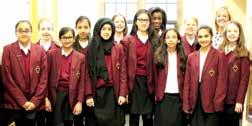

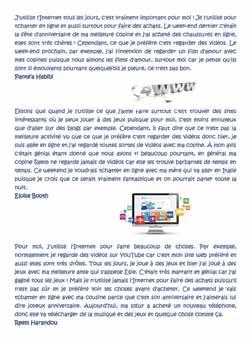

German Exchange
Taking part in the German Exchange is one of the best experiences I have had at school. Although I was extremely nervous about staying with a strange family for a whole week, I had been communicating with my partner and many of the other Germans via Whatsapp and Instagram for months beforehand so it was a lot less intimidating. We finally arrived at the school and got to meet our partners. It was very awkward for the first few hours as we tried to stumble around the language barriers but after a while everyone settled in and found ways to communicate. Over the week, we did lots of fun activities including climbing, visiting Köln and Bonn and going to the theme park ‘Fantasialand’. We met up every evening with the other pairs so everyone became really close friends. The trip definitely improved my ability to understand German through reading signs and being put on the spot to have full conversations in German with my exchange’s parents. By the end of the week I had become really good friends with my partner and everyone else so it was sad to leave but we have all kept in contact and are really excited about seeing them again when they come to England!
Lauren Crowther

I was quite nervous about the German exchange as I had never done anything like it before and I was worried that I wouldn’t get on with Jasmin, my exchange partner, or fit in with her family. However, my uneasiness was soon put to rest as she gave me a massive hug when we finally met, after our unexpectedly long journey to Bonn. We had been talking to each other on Snapchat for a while, and in the last few months prior to the trip, we had been speaking almost every day. This communication certainly made things easier as we discovered that we had similar interests and the same personality. From the first evening of the trip, we met up with others from the exchange, which gave me the opportunity to listen to the Germans speaking and their pronunciation of words which has since helped me in listening and speaking exercises in class. I would recommend the exchange to anyone who is considering it, as it was a thoroughly enjoyable experience in which I learnt a lot and made many new friends, both English and German. Asena Akdeniz Three months or so before the exchange we were given the name and contact details of our exchanges. We all began using Whatsapp as our chosen form of communication. Day by day we were learning more and more about each other: our likes, dislikes, friends, family and what we did at school. By the time the exchange came about late March, we were more than ready to go and meet them. Whatsapp proved vital up until the last second when speculation regarding the cancellation of our flight arose from their end. Throughout the exchange we visited various town centres, museums, theme parks, rock climbing centres and the school. My favourite part of the trip was going to Fantasialand on Sunday as it was great fun and it allowed us to test our German in various shops and situations. Hannah Saad

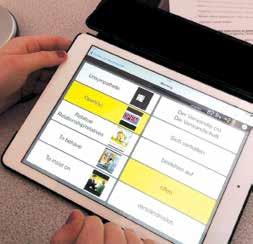
Patterdale
Our German study weekend in Patterdale for girls and boys in Y11-13 is an established event in the school calendar. This year, 12 girls, 16 boys and 5 members of staff spent a weekend in January talking and listening to German and enjoying the company, the food and the countryside. The programme has changed little over the last twenty years – why change a winning formula? We may use online dictionaries on the iPad rather than paper dictionaries but there is no signal for most mobile phone networks so we did lots of talking face to face! The very full programme included: a language ice-breaker (two lies and one truth); a film: ‘Sonnenallee’ (‘Sun Alley’), a comedy set in East Berlin in the 1970s; a round of 10 x 2 minute discussions; rehearsals for an excerpt from ‘Der Besuch der alten Dame’ and sketches by the German comedian Loriot; a walk along the lakeside; singing led and accompanied by Frau Artley ( ‘Die Gedanken sind frei’ and ‘Ein Mann, der sich Kolumbus nennt’); speed reading using newspaper articles; practice for the oral examination; and a second film: ‘Kokowääh’, a comedy directed by and starring Til Schweiger, The Patterdale staff provided delicious food including lots of cake! Der Kuchen war lecker!
Frau Sheaff
Language apps Recommended by Year 12 and Year 13
Technology is constantly changing the way we learn languages: the introduction of iPads has led to the discovery of some wonderful apps which the Sixth Form Germanists have been using to help them study.
The Flashcards app has been incredibly useful for learning vocabulary throughout my time studying German. Vocabulary learning is something that I know a lot of people struggle with as pages and pages of long lists of words can often seem daunting and overbearing. Flashcards has a completely different approach to learning vocabulary. Whether you want to quiz yourself, match up the English words with the German words or play Vocab Ninja, Flashcards has something for everyone. You can even compete against your friends in a Vocab Battle to see who knows the words better.
Lizzy Dillon Y13
Using the German Grammar Guide app as an aid to my German studies has been extremely beneficial to me. It has allowed me to fully comprehend the different tenses and cases in the German language as well as being a great help when completing homework tasks. The layout is simple and clear and it includes everything from prepositions and pronouns as well as a list of all irregular verbs. Learning vocabulary is one of the key parts of learning a second language. There are so many words and so many topics that it seems impossible to know everything. Let’s face it: It’s no fun with the ‘look, cover, write, check’ method. That might work for some people but most of us want other ways to remember confusing words and how to spell them. Memrise is a free app on the App Store that really helps with vocabulary learning. It’s really simple and easy to use on the iPads whether in school or at home. It’s perfect when revising last minute for a test you have first period that you completely forgot about! You can download courses on their website after creating an account. Many of these courses are specific to the exam board so you get the exact vocabulary lists you need. It works off short term memory and shows you the word and a few ways to remember it either by breaking down the word into shorter bits, by diagrams or by a completely wacky way that sticks in your brain.
Charlotte Fielding Y12
40










